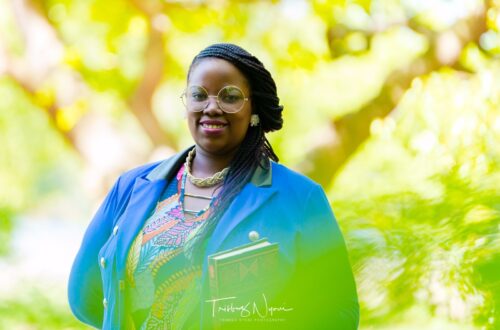
October, November, December 2020: 15 (+) Most-Anticipated Books
As many people do – I feel like this year has been simultanously long and very, very short. So, at the same time, I can’t believe I am already putting togethery my last most-anticipated book list for the year but I am also amazed that we have still three whole months to go. And no matter what, these last months (especially October) are still packed with books I can’t wait to read.
October
The Cancer Journals (Audre Lorde, Tracy K. Smith)

Synopsis: “First published over forty years ago, The Cancer Journals is a startling, powerful account of Audre Lorde’s experience with breast cancer and mastectomy. Long before narratives explored the silences around illness and women’s pain, Lorde questioned the rules of conformity for women’s body images and supported the need to confront physical loss not hidden by prosthesis. Living as a “black, lesbian, mother, warrior, poet,” Lorde heals and re-envisions herself on her own terms and offers her voice, grief, resistance, and courage to those dealing with their own diagnosis. Poetic and profoundly feminist, Lorde’s testament gives visibility and strength to women with cancer to define themselves, and to transform their silence into language and action.”
Why I am excited: I have read – and loved (who hasn’t) – a lot of Audre Lorde’s work but not this one. I have meant to read The Cancer Journals for a long time though, so this beautiful new edition complete with a foreword by the wonderful Tracy K. Smith just screams my name.
The Deep Blue Between (Ayesha Harruna Attah)
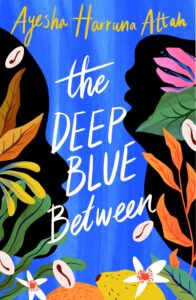
Synopsis: “Twin sisters Hassana and Husseina’s home is in ruins after a brutal raid. But this is not the end but the beginning of their story, one that will take them to unfamiliar cities and cultures, where they will forge new families, ward off dangers and truly begin to know themselves. As the twins pursue separate paths in Brazil and the Gold Coast of West Africa, they remain connected through shared dreams of water. But will their fates ever draw them back together? A sweeping adventure with richly evocative historical settings, The Deep Blue Between is a moving story of the bonds that can endure even the most dramatic change.”
Why I am excited: I really enjoyed Ayesha Harruna Attah’s last novel and am thus excited to see her first array into fiction for a non-adult audience. I am already in the middle of this book (as I thankfully received a review copy) and like it very much so far. Also, last year I interviewed Ayesha Harruna Attah for my podcast.
Zigzags (Kamala Puligandla)

Synopsis: “When Aneesha returns to Chicago for the summer, all she wants to do is write and carouse with friends. Maybe rekindle things with her old flame, Whitney, who has a serious new job and relationship. Aneesha weaves through dance parties, dive bars, and all-night Mexican joints on her bike, but keeping old friends is complicated in this charming debut novel from Kamala Puligandla.”
Why I am excited: Kamala Puligandla is the editor-in-chief of autostraddle.com, one of the very few websites I read very regularily. On her website, she writes: “My writing is for and about the radical, queer, mixed, black/brown, folks who continue to show me the great pleasure my life can be, and who inspire my visions of our future.”
Love After the End: An Anthology of Two-Spirit and Indigiqueer Speculative Fiction (ed. Joshua Whitehead)

Synopsis: “This exciting and groundbreaking fiction collection showcases a number of new and emerging 2SQ (Two-Spirit and queer) Indigenous writers from across Turtle Island. These visionary authors show how queer Indigenous communities can bloom and thrive through utopian narratives that detail the vivacity and strength of 2SQness throughout its plight in the maw of settler colonialism’s histories. Here, readers will discover bioengineered AI rats, transplanted trees in space, the rise of a 2SQ resistance camp, a primer on how to survive Indigiqueerly, virtual reality applications, mother ships at sea, and the very bending of space-time continuums queered through NDN time. Love after the End demonstrates the imaginatively queer Two-Spirit futurisms we have all been dreaming of since 1492.”
Why I am excited: I am all here for a good speculative fiction anthology and this one sounds incredible. I still have to read Joshua Whitehead’s novel but many people whose opinion I value really love it.
Memorial (Bryan Washington)

Synopsis: “Benson and Mike are two young guys who live together in Houston. Mike is a Japanese American chef at a Mexican restaurant and Benson’s a Black day care teacher, and they’ve been together for a few years — good years — but now they’re not sure why they’re still a couple. There’s the sex, sure, and the meals Mike cooks for Benson, and, well, they love each other. But when Mike finds out his estranged father is dying in Osaka just as his acerbic Japanese mother, Mitsuko, arrives in Texas for a visit, Mike picks up and flies across the world to say goodbye. In Japan he undergoes an extraordinary transformation, discovering the truth about his family and his past. Back home, Mitsuko and Benson are stuck living together as unconventional roommates, an absurd domestic situation that ends up meaning more to each of them than they ever could have predicted. Without Mike’s immediate pull, Benson begins to push outwards, realizing he might just know what he wants out of life and have the goods to get it. Both men will change in ways that will either make them stronger together, or fracture everything they’ve ever known. And just maybe they’ll all be okay in the end.”
Why I am excited: I have read one of Bryan Washington’s short stories (still not his highly praised collection) and absolutely loved his writing style which held me captured even when a particular setting wasn’t of my highest interest. This novel interests me contentwise, so this could be incredible.
Women Dreaming (Salma; translated by Meena Kandasamy)

Synopsis: “Mehar dreams of freedom and a life with her children. Asiya dreams of her daughter’s happiness. Sajida dreams of becoming a doctor. Subaida dreams of the day when her family will become free of woes. Parveen dreams of a little independence, a little space for herself in the world. Mothers, daughters, aunts, sisters, neighbours… In this tiny Muslim village in Tamil Nadu, the lives of these women are sustained by the faith they have in themselves, in each other, and the everyday compromises they make. Salma’s storytelling – crystalline in its simplicity, patient in its unravelling – enters this interior world of women, held together by love, demarcated by religion, comforted by the courage in dreaming of better futures.”
Why I am excited: This book is published by Tilted Axis Books, an independent publisher I trust a lot. Furthermore it is translated by Meena Kandasamy whose own fiction I love a lot.
Also this month: Kimiko Does Cancer (Kimiko Tobimatsu and Keet Geniza), Knot Body (Eli Tareq El Bechelany-Lynch); Over the Woodward Wall (A. Deborah Baker); The Times I Knew I Was Gay (Eleanor Crewes); An American Covenant: A Story of Women, Mysticism, and the Making of Modern America (Lucile Scott); In the Kitchen: Essays on Food and Life; Black Sun (Rebecca Roanhorse); The Once and Future Witches (Alix E. Harrow); This Is All Your Fault (Aminah Mae Safi); The Geez (Nii Ayikwei Parkes); Plain Bad Heroines (emily m. danforth); Funeral Diva (Pamela Sneed); Shit, Actually: The Definitive, 100% Objective Guide to Modern (Lindy West)
November
Butter Honey Pig Bread (Francesca Ekwuyasi)

Synopsis: “Spanning three continents, Butter Honey Pig Bread tells the interconnected stories of three Nigerian women: Kambirinachi and her twin daughters, Kehinde and Taiye. Kambirinachi believes that she is an Ogbanje, or an Abiku, a non-human spirit that plagues a family with misfortune by being born and then dying in childhood to cause a human mother misery. She has made the unnatural choice of staying alive to love her human family but lives in fear of the consequences of her decision. Kambirinachi and her two daughters become estranged from one another because of a trauma that Kehinde experiences in childhood, which leads her to move away and cut off all contact. She ultimately finds her path as an artist and seeks to raise a family of her own, despite her fear that she won’t be a good mother. Meanwhile, Taiye is plagued by guilt for what her sister suffered and also runs away, attempting to fill the void of that lost relationship with casual flings with women. She eventually discovers a way out of her stifling loneliness through a passion for food and cooking. But now, after more than a decade of living apart, Taiye and Kehinde have returned home to Lagos. It is here that the three women must face each other and address the wounds of the past if they are to reconcile and move forward.”
Why I am excited: Francesca Ekwuyasi is a multidisciplinary artist (check out her website to see all the different things she has been working on, like the short film On Faith and Queerness). While she has published a couple of short stories, this is her debut novel. The novel has already been longlisted for the Giller Prize.
Undrowned: Black Feminist Lessons from Marine Mammals (Alexis Pauline Gumbs)
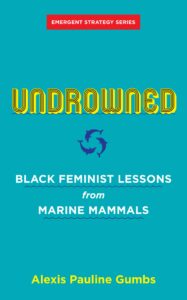
Synopsis: “Undrowned is a book-length meditation for social movements and our whole species based on the subversive and transformative guidance of marine mammals. Our aquatic cousins are queer, fierce, protective of each other, complex, shaped by conflict, and struggling to survive the extractive and militarized conditions our species has imposed on the ocean. Gumbs employs a brilliant mix of poetic sensibility and naturalist observation to show what they might teach us, producing not a specific agenda but an unfolding space for wondering and questioning. From the relationship between the endangered North Atlantic Right Whale and Gumbs’s Shinnecock and enslaved ancestors to the ways echolocation changes our understandings of “vision” and visionary action, this is a masterful use of metaphor and natural models in the service of social justice.”
Why I am excited: If you follow Alexis Pauline Gumbs on Instagram (which I highly recommend), you might have seen a lot of posts with photos of marine mammals accompanied by beautifully written captions. To be able now to read this in longform is more than exciting. Gumbs is such an incredible thinker and I am sure this book will make me look at certain things differently/ anew.
Mein Name ist Ausländer | Benim Adım Yabancı (Semra Ertan)
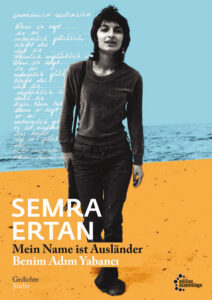
Synopsis: The book is published in German and Turkish. Here my (rough) translation of the synopsis: “Semra Ertan was born in Turkey in 1957 and joined her parents in the Federal Republic of Germany in 1972. She worked as a technical draftswoman, writer and interpreter and wrote over 350 poems and a few satires. In 1982 Semra Ertan burned herself to death in Hamburg to set an example against racism in Germany. In her poems, she deals with her experiences as a migrant in Germany, which partially represent a generation of young migrants. She also writes about the sexism she endures. Many poems express the sadness that accompanied the poet in her years in Germany, but also her anger about social injustices and her courage to face them – as well as the love that she carries within herself.”
Why I am excited: In 1982, Selma Ertan called a German station, read the title poem of this collection and announced her coming death. But while this poem is taught in Turkish schools, in Germany a lot of people have never heard of it or realized that Ertan had written so much. I am glad there will be now a book to put into people’s hands.
The Living Is Easy (Dorothy West)

Synopsis: “The first novel by Dorothy West—author of The Wedding and the youngest writer associated with the Harlem Renaissance—was one of only a handful to be published by black women during the 1940s. The Living Is Easy tells the story of Cleo Judson, daughter of Southern sharecroppers, determined to integrate into Boston’s black elite. Married to the “Black Banana King” Bart Judson, Cleo maneuvers her three sisters and their children—but not their husbands—into living with her, attempting to recreate her original family in a Bostonian mansion. Written in elegant and piercing prose, The Living Is Easy is a classic of American literature by a groundbreaking African American woman writer whose work deserves widespread and enduring recognition.”
Why I am excited: As I had planned this year (and in forthcoming years) to also read more backlist books, my interest is always peaked by re-publications. This new edition – by Feminist Press – looks great and the story sounds very intriguing.
The Factory Witches of Lowell (C.S. Malerich)

Synopsis: “Faced with abominable working conditions, unsympathetic owners, and hard-hearted managers, the mill girls of Lowell have had enough. They’re going on strike, and they have a secret weapon on their side: a little witchcraft to ensure that no one leaves the picket line. For the young women of Lowell, Massachusetts, freedom means fair wages for fair work, decent room and board, and a chance to escape the cotton mills before lint stops up their lungs. When the Boston owners decide to raise the workers’ rent, the girls go on strike. Their ringleader is Judith Whittier, a newcomer to Lowell but not to class warfare. Judith has already seen one strike fold and she doesn’t intend to see it again. Fortunately Hannah, her best friend in the boardinghouse—and maybe first love?—has a gift for the dying art of witchcraft.”
Why I am excited: Worker’s rights? Strikes? Queerness? Witches? I can barely contain my excitement.
The Freezer Door (Mattilda Bernstein Sycamore)
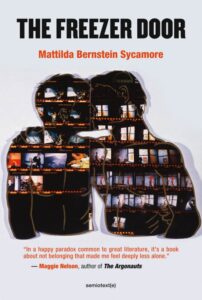
Synopsis: “A meditation on the trauma and possibility of searching for connection in a world that enforces bland norms of gender, sexual, and social conformity. The Freezer Door records the ebb and flow of desire in daily life. Crossing through loneliness in search of communal pleasure in Seattle, Mattilda Bernstein Sycamore exposes the failure and persistence of queer dreams, the hypocritical allure of gay male sexual culture, and the stranglehold of the suburban imagination over city life. Ferocious and tender, The Freezer Door offers a complex meditation on the trauma and possibility of searching for connection in a world that relentlessly enforces bland norms of gender, sexual, and social conformity while claiming to celebrate diversity.”
Why I am excited: To be honest, while the synopsis mentions a lot of words which make me look closer, after reading it I am still not sure what to expect from this book. But I am very much interested in finding out.
Also this month: Feminist International: How to Change Everything (Verónica Gago); The Thirty Names of Night (Zeyn Joukhadar); I Would Leave You If I Could (Halsey); Reconstruction: Stories (Alaya Dawn Johnson); What We Don’t Talk About When We Talk About Fat (Aubrey Gordon); Strange Beasts of China (Yan Ge, translated by Jeremy Tiang); Black History Walks (Tony Warner)
December
Mediocre: The Dangerous Legacy of White Male America (Ijeoma Oluo)

Synopsis: “After the election of Donald Trump, and the escalation of white male rage and increased hostility toward immigrants that came with him, New York Times-bestselling author Ijeoma Oluo found herself in conversation with Americans around the country, pondering one central question: How did we get here? In this ambitious survey of the last century of American history, Oluo answers that question by pinpointing white men’s deliberate efforts to subvert women, people of color, and the disenfranchised. Through research, interviews, and the powerful, personal writing for which she is celebrated, Oluo investigates the backstory of America’s growth, from immigrant migration to our national ethos around ingenuity, from the shaping of economic policy to the protection of sociopolitical movements that fortify male power. In the end, she shows how white men have long maintained a stranglehold on leadership and sorely undermined the pursuit of happiness for all. ”
Why I am excited: I have already enjoyed reading many essays by Ijeoma Oluo and love to see what she did here in the long-form. Also, I am currently reading Kate Manne’s Entitled. How Male Privilege Hurts Woman very soon and I think these two books could be in an interesting conversation.
True Names: Four Generations of My Afro Appalachian Family (Malaika Adero)

Synopsis: “African Americans in Southern Appalachia faced a particularly rural kind of oppression, no matter what names they were called-black, Melungeon or mulatto. True Names: Four Generations of My Afro Appalachian Family tells the story of four generations of Black people, burdened by the absurdities of race, who created a rich, triumphant family culture in Knoxville, Tennessee. African Americans are particularly challenged when they attempt to know the history of their families. Facts of their ancestors’ lives are often lost in time and rarely recorded. True Names brings together the evidence of the African American presence in Appalachia from the time Africans and Europeans first arrived in the region centuries ago. This well-researched narrative of two families coming together in their process of emancipation from the end of Slavery to the Black Power movement is based on oral histories, government records and family documents. Set in East Tennessee, it reaches far beyond, to other places–South, North and Midwest. In personal and political terms, it reveals the impact of the Great Migration on individuals who chose to remain in the South. Their story is that they survived and thrived by maintaining family culture and values across distance and time. True Names reveals this sustaining family culture, an untold part of the history of rural America, recently popularized in such books as Hillbilly Elegy and The Glass Castle.”
Why I am excited: Books on Appalachia have been a bit more in a general focus in the last few years – but often with glaring omissions. This book sounds really fascinating, especially that it’s based partially on oral history.
Crosshairs (Catherine Hernandez)

Synopsis: “In a terrifyingly familiar near-future, with massive floods that lead to rampant homelessness and devastation, a government-sanctioned regime called the Boots seizes the opportunity to force communities of colour, the disabled and the LGBTQ2S into labour camps in the city of Toronto. In the shadows, a new hero emerges. After his livelihood and the love of his life are taken away, Kay joins the resistance alongside Bahadur, a transmasculine refugee, and Firuzeh, a headstrong social worker. Guiding them in the use of weapons and close-quarters combat is Beck, a rogue army officer who helps them plan an uprising at a major internationally televised event. With her signature prose, described by Booklist as “raw yet beautiful, disturbing yet hopeful,” Catherine Hernandez creates a vision of the future that is all the more terrifying because it is very possible. A cautionary tale filled with fierce and vibrant characters, Crosshairs explores the universal desire to thrive, to love and to be loved as your true self.”
Why I am excited: “[D]isturbing yet hopefull” is a writing descriptions which intrigued me. And this synopsis sounds utterly intense.





